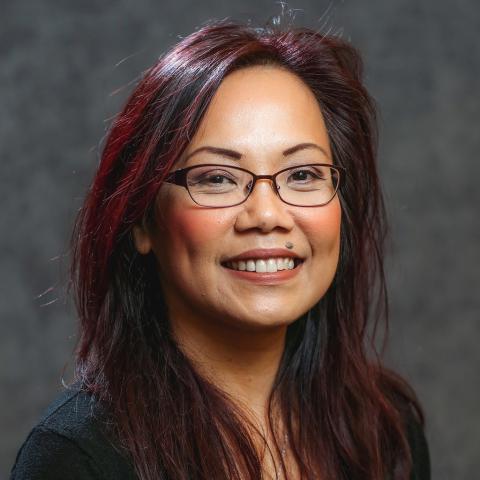Sonia M. Tiquia-Arashiro, Ph.D.

Teaching Areas:
Biological Sciences, Master of Science in Environmental Science, MicrobiologyResearch Areas:
Impact of Urbanization on Environmental Health, Microbiology, Urban RiversBiography and Education
Dr. Sonia Tiquia-Arashiro is a Professor of Microbiology in the Department of Natural Sciences at the University of Michigan-Dearborn campus (UM-Dearborn). She joined the University in 2003 and has been working as an Environmental Microbiologist for over 20 years. Dr. Tiquia-Arashiro did her graduate work at the University of Hong Kong and received her Ph.D. in Environmental Microbiology in 1997. From 1998 to 2003, she was trained in the laboratories of Dr. Thomas Richard (Iowa State University, USA), Frederick Michel J. (Ohio State University, USA) and Jizhong Zhao (Oak Ridge National Laboratory, USA).
Her research takes a multidisciplinary approach to understand the ecology, physiology, and genetics/genomics underlying important microbial processes in aquatic and terrestrial ecosystems, and the biotechnological and environmental applications of microorganisms. Her research expands our understanding of the tree of life, while simultaneously developing solutions to address the impacts of human activities on the environment which can be divided in three areas, all of which have basic research components; several have considerable public interest, and some have an applied component. These three main areas include: (1) Microbial ecology of aquatic, terrestrial and engineered systems; (2) Applications of environmental microbes in biotechnology for clean water, renewable energy, global climate change, public health, industrial and agricultural practice and healthy ecosystems; and (3) Waste processing biology and microbiology.
Her publication record has included over 90 articles in peer reviewed journals and published five books. Her first book, Molecular Biological Technologies for Ocean Sensing draws on the work of many great scientists on the application of ecogenomic sensors on autonomous platforms in the ocean. The second book, Thermophilic Carboxydotrophs and Their Applications in Biotechnology, presents an elaborate overview of thermophilic carboxydotrophs and their possible benefits to biotechnology and sustainable agriculture and production. The third book, Extremophiles: Applications in Nanotechnology, provides an extensive overview of the current research worldwide on the use of extremophiles in the biosynthesis. The fourth book, Fungi in Extreme Environments: Ecological Role and Biotechnological Significance covers a unique group of fungi that thrive in extreme environments and their biotechnological significance. The fifth book, Microbial Electrochemical Technologies, provides historical perspective of the technology and its evolution over the years, but also most recent examples of up-scaling and near future commercialization.
Her current projects span across disciplines that engage students and the public in water quality issues particularly on the impact of urbanization on the ecology and health of watersheds in Michigan. She is utilizing the amazing diversity of organisms and ecosystems of the Rouge River watershed to assess antibiotic resistance and heavy metal driven co-selection of antibiotic resistance in surface waters and sediments. Her team installed environmental sensors along the Rouge River to monitor temperature, humidity, water temperature and water level in real-time.
Dr. Tiquia-Arashiro has served on various national and international committees on issues related to the significance of trace organic pollutants to drinking and recycled water quality. She is the regional editor of the journal Environmental Technology.
Education
Ph.D., Environmental Microbiology, The University of Hong Kong, 1997
Teaching and Research
Courses Taught
- BIOL 140: Introduction to Cellular and Molecular Biology
- BIOL/MICR 385: Microbiology
- BIOL 380: Epidemiology
- BIOL/MICR 405/505: Applied and Environmental Microbiology
- BIOL/MICR 406: Microbial Genetics
- BIOL/MICR 485: Physiology of Microorganisms
- BIOL/MICR 440: Microbial Genetics and Physiology Laboratory
Research
Microbial ecology, watershed microbiology, denitrification, biological treatment of organic wastes and waste processing microbiology, bioenergy and alternative fuel production by way of microbes, microbial source tracking, remediation of organic and metal pollutants by microorganisms, resistance gene ecology.
Selected Publications
Tiquia-Arashiro, S.M. and Pant, D. (2020) Microbial Electrochemical Technologies. CRC Press. 508 p.
Tiquia-Arashiro, S.M. and Grube, M. (2019) Fungi in Extreme Environments: Ecological Role and Biotechnological Significance. Springer International Publishing. 626 p.
Tiquia-Arashiro S.M. (2018) Lead absorption mechanisms in bacteria as strategies for lead bioremediation. Applied Microbiology and Biotechnology. 102:5437–5444.
Oest A, Fenner M, Azzopardi D, Alsaffar A and Tiquia-Arashiro SM (2018) Patterns of Change in Metabolic Capabilities of Sediment Microbial Communities along River and Lake Ecosystems. Journal of International Microbiology. 2018:6234931. doi: 10.1155/2018/6234931.
Bowman N, Patel P, Sanchez S, Xu W, Alsaffar, A and Tiquia-Arashiro SM (2018) Lead-Resistant Bacteria from Saint Clair River Sediments and Pb Removal in Aqueous Solutions. Applied Microbiology and Biotechnology. 102: 2391–2398.
Awards and Recognition
Stanford’s list of World’s top 2% of working scientists, 2023
Stanford’s list of World’s top 2% of working scientists, 2022
Stanford’s World’s top 2% of working scientists [Career-long citation impact], 2020
Stanford’s World’s top 2% of working scientists [Citation impact during the single calendar year], 2020
UM-Dearborn Distinguished Research Award, 2010
Promotion to Associate Professor by exception to time in rank criterion, 2008
